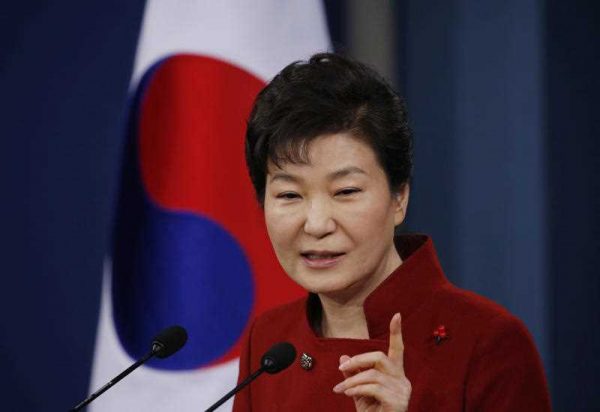These range from the interference of the National Intelligence Services in the 2012 presidential election to the government’s harsh crackdown on an anti-government rally in November 2015.
What’s more, there has been a growing concern that freedom of the press, a key characteristic of liberal democracy, is under threat. Under the Lee Myung-bak government in 2011 Freedom House changed South Korea’s press freedom status (both online and offline) from ‘Free’ into ‘Partly Free’. These indexes have continued to decline over the past three years.
One of the crucial aspects of representative democracy is the existence of institutional mechanisms to monitor potential abuse of delegated leadership such as the legislature and the judiciary, as well as via elections that enable the public to politically punish their leader.
Yet, South Korea’s government lacks a fundamental willingness to communicate with the public and listen to political critiques. At the same time, other political actors appear to be incapable of checking and monitoring government behaviour, which in turn may concentrate power in the hands of the executive branch. It is not a secret any more — even for foreign observers — that South Korea’s democracy is moving backward in time. Park appears to be ‘Following in the footsteps of her dictator father’.
The ongoing history textbook controversy illustrates this concern. In October 2015, the Education Ministry announced its intention to adopt state-written history textbooks for secondary education, a policy seen in several autocracies. According to the government, the current history textbooks, issued by eight private publishers, are left-leaning and may distort students’ views on South Korea or even lead students to develop pro-North Korea sentiments. The government has attempted to justify its decision by stressing its responsibility to teach the ‘correct history’ to students, so that the younger generation can have a ‘right and positive’ view. The decision immediately brought huge backlash from both the public and academics.
Opponents have expressed concerns about the government definition of ‘correct history’ and about the potential for ideological and political biases. According to Gallup Korea, a public survey shows that the textbook controversy immediately pulled down the president’s approval rating. History professors in major universities including Seoul National University, Korea University and Yonsei University, as well as overseas academics, announced that they would not participate in writing a state textbook. And yet despite such widespread opposition, the government seems unwilling to openly discuss the issue; rather, it is pressing ahead with the decision.
So how have South Korea’s opposition parties responded? Unfortunately, there has been little action. The leading opposition party, New Politics Alliance for Democracy (NPAD), has been unable to function effectively due to disruptive internal factional politics. NPAD lost two by-elections held in April and August 2015 — despite a number of scandals that saw the ruling party’s approval ratings plummet. To make matters worse, one of the co-chairmen of NPAD, Ahn Cheol-soo, has recently defected from the party — which has since changed its name to the Minjoo Party of Korea — and created a new party, provisionally called the People’s Party. Ahn and his new party have their sights set on the upcoming legislative election.
The fracturing of South Korea’s opposition could significantly impact the 2016 legislative election to be held on 13 April. The emergence of a new opposition party could split the opposition vote and may allow the ruling Saenuri Party to increase its majority. The Saenuri Party has openly stated its goal of winning 180 seats in the election (it currently holds 156 seats out of 300), which would enable it to pass bills unilaterally. With an additional 20 seats, the ruling party could even amend the constitution, by transforming the current five-year single term presidency to allow for multiple presidential terms or parliamentary system that favours the current ruling party. This would undoubtedly be a discouraging step for South Korea’s democracy.
This may sound ambitious but it would not be unattainable as opposition votes will be split — Ahn’s new party may take votes from the Minjoo party’s traditional ground. According to a December 2015 Realmeter poll, the ruling Saenuri Party has the highest support rate of any individual political party at 37.2 per cent, yet the combined support rating of the two leading opposition parties — the Minjoo Party of Korea and Ahn’s new People’s Party — outnumbers that of the ruling party, at 22.4 per cent and 19 per cent respectively.
This might just be a temporary phenomenon due to heightened expectations for a new party. But if the two opposition parties can form an alliance they may be able to pose a serious challenge to the Park government. Though, considering the factional politics that divided the old NPAD, the chance of an alliance would be slim. Whether they manage to form an alliance or not, the 2016 legislative election will be a watershed moment for Park Geun-hye government, and for South Korea’s democracy.
Chungshik Moon is a lecturer at the School of Politics and International Relations, Australian National University.
This article is part of an EAF special feature series on 2015 in review and the year ahead.


Another contributor was raising concerns about S Korea’s democracy on January 8th and the more recent prosecution of an academic for her non-PC book on the Comfort Women also raised similar concerns.
Are all three of these observers being alarmist? Or is there a pattern here which truly merits attention?
Can the legislature in S Korea alter the Constitution without having to call a referendum? Is there an independent Supreme Court which can rule on the legality of legislation?